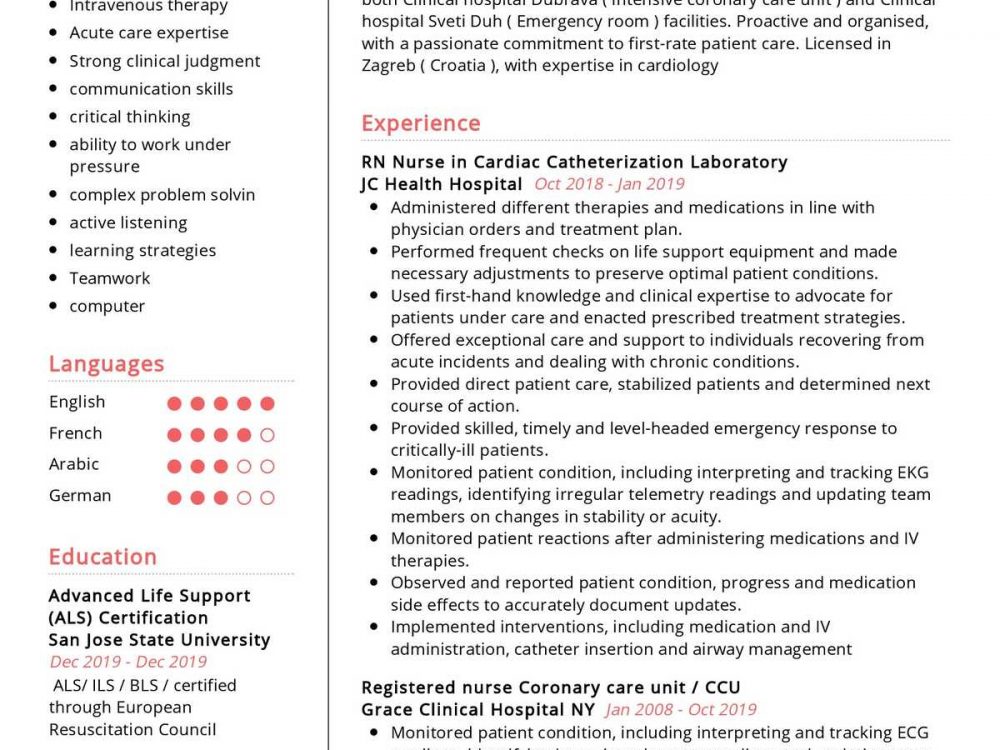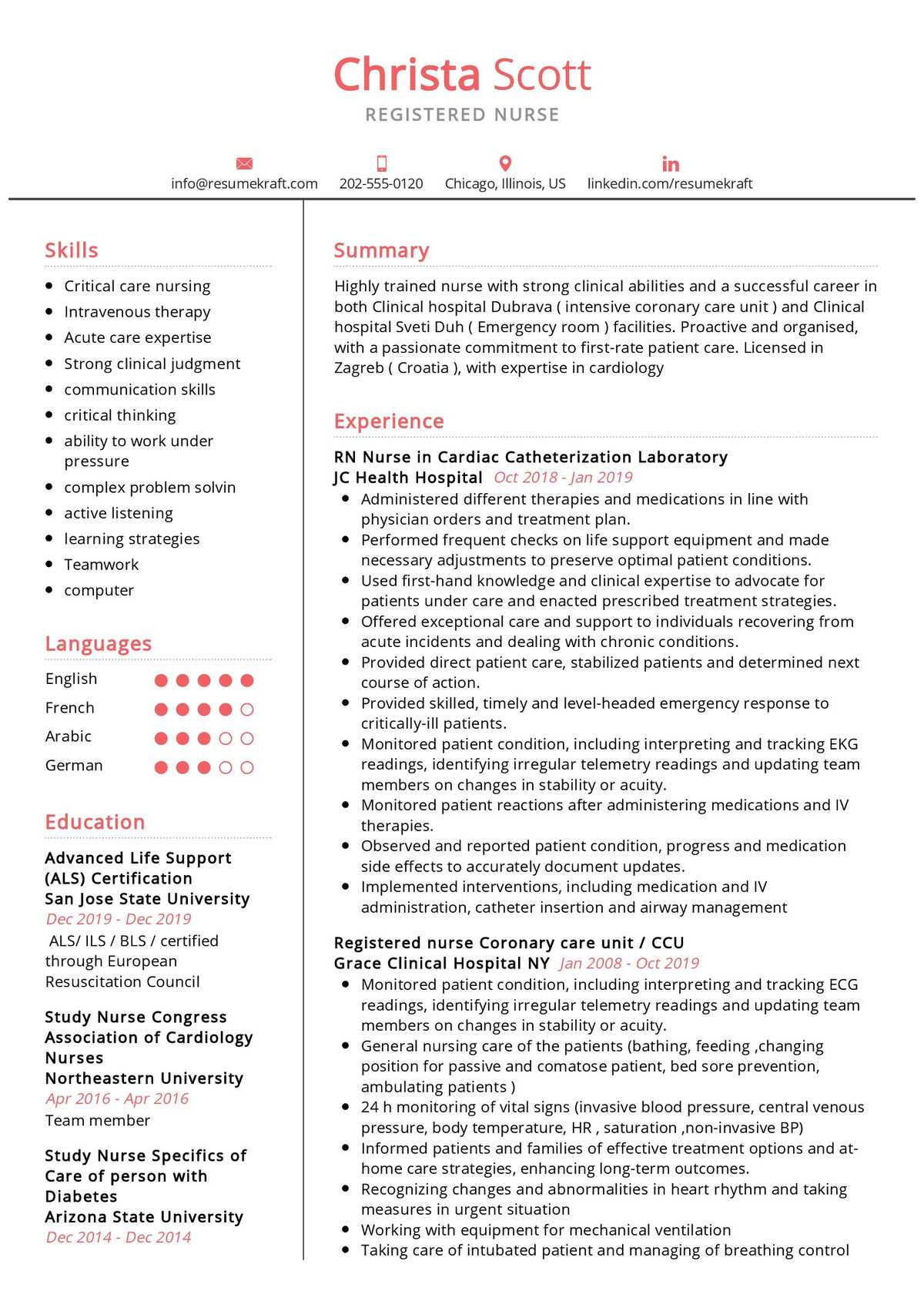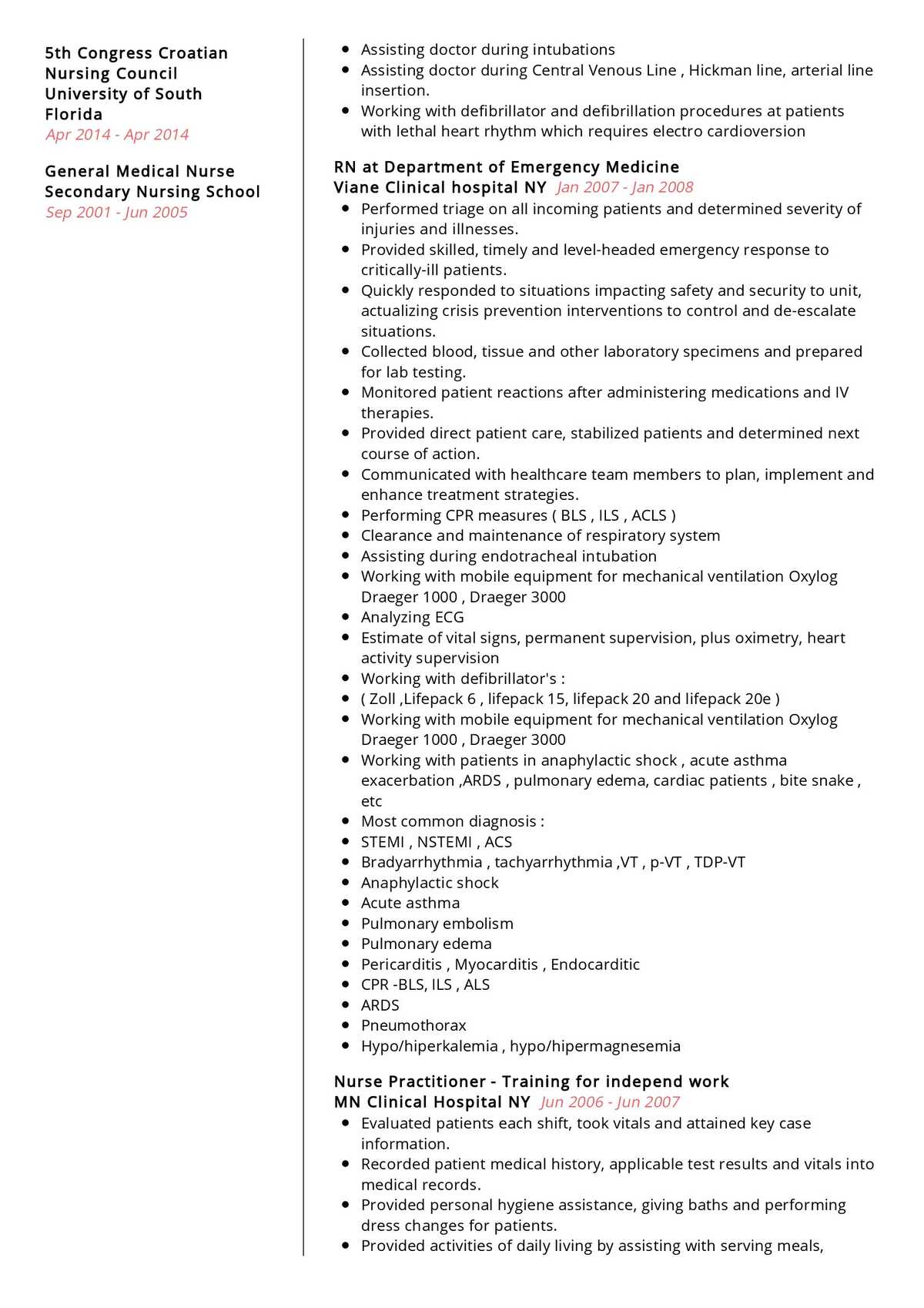A perfect way to write a Registered Nurse Resume
Many job seekers are looking for a job as a Registered Nurse. With the current shortage of RNs worldwide, it’s no wonder they’re in high demand and need to get their resume noticed. In this guide, we’ll show you how to write an impressive and personalized resume with tips from professional nurses who know what to do when you’re not sure.
But first, let’s run through how your resume works so that we can ensure you have the best chance of getting your dream job. You should read this section first if you haven’t done so already.
Resume Overview
A Resume is a document that acts as an application from your personal background, education and experiences to the prospective employer. Your resume covers the essential information about you to make the company hire you as a new employee. If well-written, your resume can help you become a highly qualified candidate for the position you want.
The resume writing process varies for every job seeker. The process of putting your professional goals and personality to paper is a bit tricky. If you know how to write a resume expertly, there is no reason why you should not get the position you want. You have first got to decide the format, function, and purpose of your resume.
A typical resume format consists of an introduction followed by your skills, education, and other relevant information arranged in chronological order. In essence, it is a document telling your experience in the workplace and the skills you possessed during your employment.
Registered Nurse Job Description:
A Registered Nurse (RN) is an individual who is dedicated to the care of patients in the fields of medicine, research, and nursing. They work under a registered nurse or a licensed professional nurse. The main responsibility for practicing safe, effective, and quality nursing care is taken by nurses. They are entitled to practice nursing in a variety of settings like hospitals including surgery wards, intensive care units, emergency departments, and clinics. Registered nurses also offer their services in public health facilities such as schools, doctors’ offices, and nursing homes.
While providing nursing care, registered nurses make sure they evaluate all registered patient conditions and administer treatments to improve their health status. They also educate people regarding the focus of the treatment so that they can help patients manage ailments successfully without the intervention of healthcare providers. Moreover, registered nurses keep records of patients’ health status.
Registered Nurse Responsibilities:
- Provide quality nursing care
- Evaluate patient’s health status
- Educate patients concerning the issue and focus of the treatment
- Manage medication and prescribing it in the right dose
- Ensure that patients’ medical records are maintained in a safe manner
- Maintain confidentiality of information regarding patient’s health condition and treatments. – Provide consultation to patients and their families
- Provide quality care and treatment to patients
- Promote the principles of infection prevention to clients and staff. – Maintain proper sanitation in the work area
- Act on potential risks of infections
- Act on the potential risk of injury or occupational hazards
- Act on issues regarding the quality of care
- Monitor patient’s condition, pertinent conditions, and activities
Registered Nurse Education:
Experience in practicing nursing is not a must for one to become a registered nurse but you should possess the appropriate education. The education that is required to become a registered nurse includes an associate’s degree in nursing. Some employers also require a Bachelor of Science in Nursing (BSN) or a Doctorate of Nursing Practice (DNP). – Associate’s Degree in Nursing: The associate’s degree program takes about 2 years to complete. The curriculum will introduce you to a wide array of health issues. These programs are designed for those who want to become professionals in the healthcare industry. – Bachelor of Science in Nursing: The BSN program takes about 4 years for complete. They focus on teaching the necessary skills required for providing quality care and treatment to patients and managing their health records correctly. – Doctorate of Nursing Practice: The DNP program takes two years to complete. A DNP program is designed for those who already have experience in the healthcare industry.
Tips to Write a Registered Nurse Resume Summary:
Resume Summary is the first page (sometimes the only one) that should be looked at by a recruiter. Therefore, it should be short yet comprehensive. – Use action verbs stating your achievements and accomplishments
- Summarize your resume with a 3 to 4-sentence summary
- Use action verbs and make them short and concise.
- Keep the rest of your resume short, but make sure you include all the necessary information you want an employer to know about you.
- Be honest, genuine, and enthusiastic in your summary of achievements and accomplishments
- Include all relevant experience, education & training information so that the recruiter can get a clear picture of what kind of job seeker you are.
20 Must have Registered Nurse Skills:
- Active Listening: Actively listen to patients by asking questions to understand their concerns, problems, and needs.
- Communication Skills: Exhibit the ability to communicate effectively while providing care.
- Customer Service: Actively listen to a patient’s needs and respond accordingly.
- Computer Literacy: Effectively use computers for health information search and communication systems management results distribution
- Empathy: Listen to the patient’s concerns and try helping them in any possible way possible with patient’s needs
- Initiative: Greet and welcome patients with a smile, remember callbacks, and follow-up with patients
- Interpersonal Skills: Communicate effectively with other staff members in the healthcare setting.
- Judgment and Decision Making: Actively listen to patients’ needs as they are described by patients or family members/caregivers, and assess their response to treatments.
- Medical Terminology: Use medical terminology names appropriate for patient treatment and care in the hospital or clinic
- Memory: Recall information about the patient’s condition, treatment, and test results
- Motivation: Work as part of a team, to help patients feel better and recover from injuries or illnesses.
- Physical Strength: Move patients and equipment as needed during treatments.
- Problem Solving: Organize services for patients with complex care needs in an accurate, timely manner
- Professionalism: Practice good professional and ethical behavior, follow healthcare principles and laws.
- Teamwork: Actively participate in a team as part of a multi-professional healthcare environment
- Time Management: Effectively manage time by working efficiently and productively to accomplish tasks and projects in a timely manner
- Written Skills: Write effective reports, maintain medical records, treat patients, work effectively with others in the healthcare setting…
- Computer Skills: The ability to use computers for order entry, modify charts, and transmit/receive health information.
- Critical Thinking: Analyze clinical information and make clinical decisions based on data, base clinical decisions on current research.
- Documentation: Use EMR systems accurately and consistently for documentation requirements, correctly document daily progress notes and care plans
Tips to write a Registered Nurse resume with no experience:
- Keep it simple, short, and to the point.
- Research where you can find a good example of a nurse with little or no experience.
- Avoid writing about absolutely everything that you have done in your life, stick to the facts about your education and work history, including dates and steps on how you progressed along the way.
- However, don’t lie about your work history either.
- Make sure to spell your name correctly, use proper grammar and punctuation
- Proofread it before you send it out to make sure there are no mistakes.
If you have several years of experience in healthcare without a degree or certification, it is a good idea to include those items as well because they are part of the professional qualifications that are typically required for employment in the healthcare field.
Guide to write a Registered Nurse Cover Letter:
A well-written Registered Nurse Cover Letter is an important part of the application process. The cover letter presents you to the employer and highlights your qualifications. It should be short (one page), sweet and to the point (avoid extra words or fluff), and professional. If you have a personal website or blog, a link to it should be included along with your contact information (email address). If you have personal social media accounts, a link to those as well is recommended.
key takeaways:
Follow these guidelines and you’ll get more eyes on your content. But there’s more:
- If you have a social media presence, consider linking to it here.
- Provide your phone number or email address. Responding to and engaging with people who reach out will be quicker and easier, and give you more opportunities to build relationships that can lead to future business opportunities.
- Always be genuine. This is not the time to pull any stunts.



